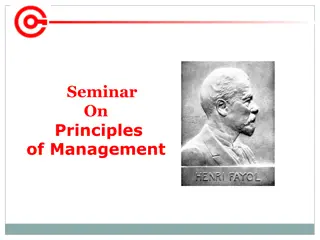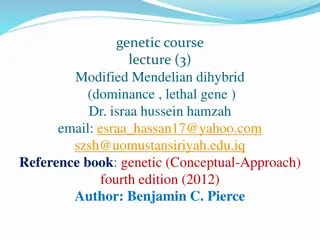United States v. Microsoft Corporation
The historical significance of Standard Oil and United States v. Microsoft Corporation in the context of antitrust laws, monopolies, and business practices. Learn about the rise of megacorps through efficiency, integration, and market dominance, contrasting wealth accumulation with royal fortune. De
4 views • 18 slides
Principles of the Ghana Civil Service Code of Conduct
The Code of Conduct for the Ghana Civil Service, outlined by Elizabeth Obeng-Yeboah, emphasizes principles such as abiding by the constitution and laws with dignity, integrity, and professionalism. It sets standards for conduct, avoiding conflicts of interest, maintaining political neutrality, and u
1 views • 34 slides
Academic Freedom and Shared Governance in Higher Education
Academic Freedom and Shared Governance are foundational principles advocated by the American Association of University Professors (AAUP) to ensure educators have the freedom to explore, research, teach, and discuss without censorship. These principles empower educators to enhance student learning an
0 views • 9 slides
Essential Principles of Management Discussed in Seminar
Explore the foundational principles of management discussed in a seminar on principles of management. Delve into topics such as division of work, authority, discipline, unity of command, and unity of direction as outlined by Henri Fayol. Gain insights into the importance of these principles for effe
0 views • 22 slides
ABUSE OF DOMINANT POSITION
Carishma Singh explains how abuse of dominant position (Section 4) is defined under the Competition Act, emphasizing that dominance alone is not anti-competitive, but coupled with abusive conduct, it can harm competitors, consumers, and markets. The law applies to both private and government entitie
0 views • 20 slides
Understanding Measures of Prejudice in Research: Social Dominance Orientation, Stereotype Content Model, and More
Explore methods for measuring prejudice in research, including explicit and implicit attitude measures, Social Dominance Orientation (SDO) scale, and Symbolic (Modern) Racism Scale. Learn about the aims of research, selecting appropriate methods, and theoretical frameworks to apply.
0 views • 12 slides
Connecting the Future Soldier with Technological Resources for Information Dominance
Panel discussion on the integration of computer hardware, enterprise software, and solutions for the future soldier's information dominance. Overview of ITES-3S and RS3 contracts providing IT support and professional services for the Army. Comparison of ACCESS and ITES-4S focus areas and evaluation
0 views • 6 slides
International Law of War: Nuremberg Principles and Accountability
The Nuremberg Principles, derived from the trials of Nazi officials for war crimes, establish accountability in international law. These principles hold individuals responsible for committing acts considered crimes under international law, regardless of their position or orders received. The assumpt
2 views • 22 slides
Understanding Incomplete and Co-dominance in Genetics
Phenotypes and genotypes play crucial roles in understanding incomplete dominance and co-dominance. In incomplete dominance, alleles blend to produce a new phenotype, while in co-dominance, both alleles are expressed equally. Examples and problems illustrate these concepts further, aiding in genetic
0 views • 12 slides
Promoting Ethical Principles in Social Science Research
Explore the challenges and strategies for translating and applying ethical principles, especially in emergency contexts. Learn key questions in social science research and how to ensure information contributes to community actions. Understand the importance of considering ethical principles in all w
0 views • 21 slides
Understanding Genetic Markers in Molecular Mapping
Genetic markers play a crucial role in gene mapping within molecular biotechnology. They are fragments of DNA associated with specific genomic locations, aiding in identifying DNA sequences and analyzing genetic variation. Various types of genetic markers such as RFLP, SSR, and SNP offer insights in
1 views • 26 slides
The Globalization Debate: Understanding Contemporary Perspectives
The debate on globalization revolves around defining it, its impact on state power, and the role of politics. Three main schools of thought - Hyperglobalizers, Sceptics, and Transformationalists - offer contrasting views on whether globalization is primarily an economic phenomenon reshaping traditio
0 views • 12 slides
Understanding Multiple Alleles in Genetics
Explore the concept of multiple alleles in genetics through examples like pea color inheritance and human blood types. Learn how multiple alleles create various phenotypes and genotypes, illustrating concepts of dominance, recessiveness, and co-dominance in genetic inheritance.
0 views • 15 slides
Fundamentals of Design: Elements, Principles, and Formats
Understanding the essentials of design such as elements like text, graphics, and white space, principles like dominance, and formats like page layout and measurement units are crucial for creating visually appealing and effective designs. Designers need to grasp concepts like unity, consistency in m
0 views • 40 slides
Strategies for Interim Injunctions in Abuse of Dominance Cases
This mini-series event focuses on strategies and tips for interim injunctions in abuse of dominance cases, chaired by Sir Richard Aikens. Various perspectives are explored, including a claimant's viewpoint by Aaron Khan, document requirements by David Heaton, and insights from Fergus Randolph QC as
2 views • 23 slides
Understanding Dominance in Genetics: The Role of Alleles and Phenotypes
Dominance in genetics refers to the interaction of alleles at the same gene locus. Complete dominance occurs when one allele masks the effect of another in a heterozygous genotype, leading to a phenotype indistinguishable from the dominant homozygote. This concept is crucial for predicting genetic o
1 views • 18 slides
Study Guide for Principles of Management Course at Africa Research University (ARU)
Welcome to Africa Research University (ARU)! This study guide is designed to help you navigate through the Principles of Management course (Course Code: PRM4) at ARU. It provides an introduction to the course content, emphasizing the importance of developing management skills to effectively lead and
1 views • 40 slides
Understanding ARM RISC Design Philosophy and Its Impact
Delve into the world of ARM processors, exploring the RISC design philosophy that underpins their efficiency and widespread application. Learn about key principles, compare RISC with CISC, and discover how ARM's simplicity, orthogonality, and efficient architecture contribute to its dominance in mob
0 views • 12 slides
Understanding Coronary Artery Anatomy and Dominance
Explore the intricate details of coronary artery anatomy with a focus on the right and left coronary arteries, as well as variations such as large right dominance, small right dominance, co-dominance, and left dominance. Learn about the importance of understanding these structures in relation to car
0 views • 8 slides
Principles of Training: Overload, Specificity, and Progression
Principles of training encompass overload, specificity, and progression. Overload requires doing more than usual, specificity involves tailored activities, and progression ensures gradual advancement. These principles are vital for improving fitness levels safely and effectively, emphasizing the nee
8 views • 17 slides
Understanding Social Hierarchies in Animal Behavior
Social behavior in animals involves living in social groups, establishing social hierarchies, and exhibiting dominance behaviors. Animals have developed various signals and behaviors to interact successfully within these groups. Social hierarchies offer advantages such as increased chances of surviv
1 views • 20 slides
Understanding Dominance Rule in Data Analysis
Dominance rule in data analysis involves identifying and attributing information to dominant observations that account for a majority of a measure. Concentration ratios, like Herfindahl Indices, can reveal dominant players in various sectors. Dramatic changes in time series data may also indicate do
4 views • 6 slides
Understanding Punnett Squares and Genetic Crosses
Explore the world of genetics through Punnett squares and genetic crosses, where traits like eye color are predicted using Mendel's principles. Discover the laws of dominance, segregation, and how to determine genotype and phenotype ratios in offspring.
0 views • 23 slides
Understanding Genetic Inheritance: Going Beyond Mendel
Exploring genetic inheritance beyond Mendel's principles, this content delves into topics like incomplete dominance, codominance, pleiotropy, epistasis, and multiple alleles. Discover how genes interact to shape phenotypes and learn about interesting genetic phenomena like Marfan syndrome and the AB
0 views • 20 slides
Effective Partnership and Mutual Accountability in Nutrition Clusters
The content discusses the minimum commitments needed for participation in Nutrition Clusters, explains the Principles of Partnership, and explores how these principles can enhance coordination and accountability to affected populations. It emphasizes partner commitments, such as leadership, mainstre
0 views • 7 slides
Overview of Fundamental Principles of Space Law and Outer Space Treaties
The content discusses the fundamental principles of space law highlighted at the United Nations Space Law Conference 2020, focusing on key treaties such as the Outer Space Treaty of 1967 and associated rights, duties, and obligations of states in space exploration and use, including non-appropriatio
0 views • 16 slides
Overview of Directive Principles of State Policy in Indian Constitution
Directive Principles of State Policy (DPSP) in the Indian Constitution encompass social, economic, and political programs aimed at realizing ideals of justice, liberty, equality, and fraternity. They are non-justiciable but guide the state in legislative matters. Classified into Socialistic, Gandhia
0 views • 24 slides
United States Foreign Policy: Past, Present, and Future
The post-war period marked the rise of the United States as a key player in international relations, driven by ethical and democratic principles. Today, the US foreign policy focuses on maintaining global dominance, combatting terrorism, upholding economic interests, promoting democracy, and seeking
0 views • 16 slides
Understanding Genetic Inheritance Through Punnett Squares
Explore the fascinating world of genetic inheritance by delving into Punnett Squares, traits, alleles, dominance principles, phenotypes, and genotypes. Discover how characteristics are passed down from one generation to another through genes. Learn about homozygous and heterozygous traits and get re
0 views • 22 slides
Understanding FAIR Principles in Biomedical Research
The FAIR principles - Findable, Accessible, Interoperable, and Reusable - provide a framework for ensuring scientific data in biomedical research is managed and shared effectively. This informative session delves into the theory and practice of FAIR principles, emphasizing the importance of data qua
0 views • 28 slides
The FAIR Principles for Data Management and Stewardship
Embrace the FAIR principles - Findable, Accessible, Interoperable, Re-usable - for effective scientific data management and stewardship. Learn how annotations enhance data FAIRness and the key attributes of each principle. Dive into the high-level guiding principles that ensure data is globally uniq
0 views • 25 slides
Understanding Genetic Inheritance Patterns and Human Blood Types
Explore how genes can be inherited based on patterns such as Mendel's dominance, incomplete dominance, co-dominance, and multiple alleles. Dive into the complexities of human blood types controlled by one gene with three alleles - A, B, and O, resulting in four phenotypes and six genotypes. Learn ho
0 views • 19 slides
Understanding the Guiding Principles for Evaluators
This content provides insights into the Guiding Principles for Evaluators, including their history, assumptions, and key principles such as Systematic Inquiry and Competence. The workshop aims to increase knowledge about ethical evaluation practices and stimulate discussions within the evaluation co
0 views • 22 slides
Guiding Principles for GETSI/INTEGRATE Webinar – Materials Development and Goals
The webinar presented by David Steer from the University of Akron focuses on guiding principles for material development in the context of GETSI/INTEGRATE modules. It outlines goals for the session, including discussing components of the guiding principles, examples of meeting those principles, and
0 views • 13 slides
Understanding Monohybrid Crosses: Incomplete Dominance and Codominance
Explore the concepts of incomplete dominance and codominance through monohybrid crosses. Learn how alleles interact to produce unique phenotypes in plants and horses. Discover the outcomes of crosses between homozygous dominant, heterozygous, and homozygous recessive individuals. Gain insights into
0 views • 7 slides
Understanding Genetics: Mendel's Experiments and Inheritance Patterns
Delve into the world of genetics through Mendel's groundbreaking experiments with pea plants, exploring traits inheritance, Punnett squares, dominant and recessive alleles, incomplete dominance, and co-dominance. Gain insights into how traits are passed from parents to offspring and predict offsprin
0 views • 9 slides
Understanding Henri Fayol's 14 Principles of Management
Henri Fayol, the Father of Modern Management, introduced 14 Principles of Management in 1916, outlining essential guidelines for effective management. These principles cover areas such as division of work, authority and responsibility, discipline, unity of command, and unity of direction. By followi
0 views • 19 slides
Principles of Management: Understanding Henri Fayol's 14 Key Principles
Explore the foundational principles of management through the lens of Henri Fayol's 14 key principles, which offer valuable insights into managerial decision-making and organizational interactions. Delve into the history of Henri Fayol, his contributions to management theory, the concept of authorit
0 views • 14 slides
Game Theory Concepts and Models in Strategic Decision-Making
Exploring various solution concepts and game models in the realm of game theory, this presentation delves into topics such as Nash equilibrium, dominance, dominant strategy equilibrium, mixed strategies, and iterated dominance. It discusses how players decide on particular equilibria, possible solut
0 views • 39 slides
Understanding Monohybrid Crosses in Genetics
Explore Mendel's monohybrid crosses using pea plants to study inheritance of specific characteristics, such as plant height. Learn about genetic principles like segregation and dominance through practical examples and Punnett squares.
0 views • 18 slides







































